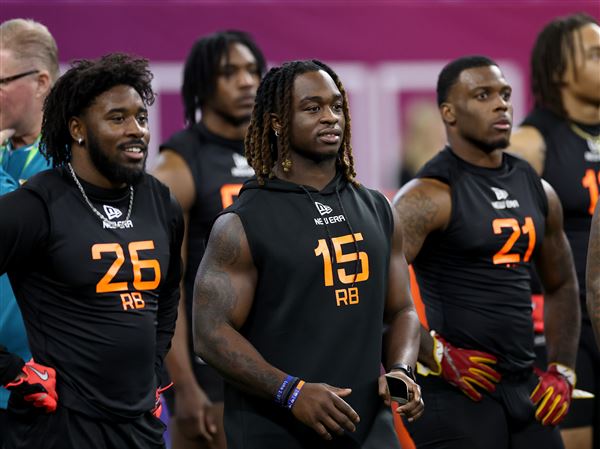When it comes to organizing Pittsburgh’s annual Pride celebration, the Delta Foundation’s prowess is plain to see.
Its decision-making and budget processes? Not so much, say critics who question how the tax-exempt nonprofit spends its nearly $1 million budget.
Such concerns have attracted less attention than Delta’s decision to feature controversial Australian rapper Iggy Azalea at this year’s Pride. But they simmered even after she was replaced by pop star Nick Jonas, and were a key point of dispute during a June 9 meeting between Mr. Van Horn and critics, participants say.
“When a community knows where the money is going, that can elevate the entire community,” said LGBT activist Vanessa Davis at the time. But such transparency “doesn’t exist with Delta.”
Even Delta’s crowd estimates can be murky. This year’s Pride attracted “record attendance of approximately 110,000 people (according to City estimates),” Delta President Gary Van Horn said in a statement
But neither the mayor’s office nor public-safety officials could vouch for that number, which Mr. Van Horn later said was based on a “matrix” provided by sources he didn’t identify.
“I don’t know where they would have gotten that figure from, but it didn’t come from us,” said Public Safety spokeswoman Sonya Toler.
As a tax-exempt nonprofit, Delta must publicly disclose an annual financial statement, called a Form 990. The 2013 filing, the most recent available, suggests Delta spent $205,388 on the year’s Pride events. By comparison, according to interviews and financial records, organizers in Cleveland and Baltimore spend less than $150,000 per year on Pride events.
Yet in 2013, Pride accounted for just over one-quarter of Delta’s $929,689 budget. Another $544,542 was spent “to increase awareness and understanding of and improve the quality of life of [the region’s] GLBT community.”
The 990 gives little indication of what, exactly, that entails. For example, Delta hosts an annual picnic and published a gay-themed magazine, Equal, from late 2012 to 2014. But neither endeavor is broken out in the report.
Delta’s income figures are also unclear. It reported raising $564,447 in “program service revenue,” including ticket sales and other revenues associated with pride events. But the 990 doesn’t tie $296,896 of that money to any program at all.
Mr. Van Horn asked that questions be emailed for review by Delta’s board. He answered many queries, but not those in a follow-up email.
Asked what activities the $544,542 covered, he said he would provide an “itemized ledger for these items ... when we receive it.” He did not do so by deadline for this story.
Delta’s 990 “is probably compliant with [reporting requirements], but there are some questions in there,” said Thomas Ryan, a partner at the firm of Horovitz, Rudoy & Roteman who reviewed the 2013 filing.
Still, Mr. Ryan said a lack of detail “doesn’t mean there is something wrong. … Usually you look for conflicts of interest, and I don’t see anything that suggests that is happening.”
In fact, Delta had just two paid staffers in 2013 and one today; Mr. Van Horn is not paid. And Delta may not be as flush as critics suspect.
According to the 990, Delta started 2013 with $18,634 in cash and investments. It owed $50,433 in outstanding bills, credit-card debt and other liabilities.
By 2013’s end, Delta had no cash and $9,981 in investments, while bills and other obligations had quadrupled to $207,321. That’s not including a $442,400 mortgage Delta took to buy a North Side building with office space and rental apartments.
Based on those numbers, Mr. Ryan said, Delta appeared “essentially insolvent” by late 2013.
“That’s one that would get a board excited,” said Mr. Ryan, who added, “I don’t understand why Delta has a building of that size when it only had two employees.”
At the time, Mr. Van Horn told the Post-Gazette the structure would provide community meeting space, and “stability” to Delta. The building formally opened in May; last week Mr. Van Horn said it had hosted six meetings for various organizations, which he did not identify.
Mr. Van Horn said a year-end snapshot provides an incomplete picture of Delta finances.
“We are invoiced for many items [related to Pride] before January,” he said. (Delta also hosted an appearance by actress Bernadette Peters in early 2014.) But revenue for the event can arrive months later, he said, so “our fourth quarter would not reflect the overall picture.”
Delta calls itself “the leading LGBT advocacy organization in Western Pennsylvania,” and its influence is not limited to event planning. Allegheny County Executive Rich Fitzgerald, for one, credits Delta for 2009 efforts to support a countywide Human Relations Commission, which can investigate and penalize anti-LGBT discrimination.
“They were very professional in presenting their case, and helpful as we crafted the legislation,” said Mr. Fitzgerald, who was county council’s president at the time.
Delta has also aided other nonprofits, often by organizing fundraisers on their behalf. Mr. Van Horn provided a breakdown of $96,177 of such activity.
For example, LGBT human-service group Persad received $13,250, mostly through Delta fundraisers in 2007 and 2008, said Executive Director Betty Hill.
Delta also supported some other causes, including $7,827 for the Animal Rescue League. ARL executive director Dan Rossi said the money stems from a Bingo fundraiser Delta held in 2014. “We partner with the gay community a lot,” he said: ARL, for example, cares for pets when owners living with AIDS are hospitalized.
Critics fault Delta for spending more on one year’s pride events than it has raised for other LGBT groups during its entire history.
“The money matters because there is only so much of it,” said Harrison Apple, co-director of the Pittsburgh Queer History Project.
Mr. Apple noted that unlike other LGBT organizations, Delta was founded largely by bar owners, Mr. Van Horn among them. Gay bars have long been LGBT community touchstones, said Mr. Apple, and their owners “did a lot of great work” supporting other institutions. Still, they “weren’t community organizers — they were business owners,” and Delta “has no infrastructure for community outreach or criticism from within.”
Unlike some Pride organizers elsewhere, Delta’s website doesn’t post bylaws or financial information, or identify the heads of Pride planning committees. It also doesn’t hold public meetings.
“You can’t claim the resources of the community ... without knowing what that community says it wants,” activist Joy KMT told a June 11 Hill District gathering of fledgling LGBT group Roots Pride, which held dissenting Pride activities this year.
Mr. Van Horn said Delta is “not a membership organization” where dues-paying members choose board members or weigh in on policies. But “our committees are open to the public and involve almost 400 people,” Mr. Van Horn wrote. “We advertise this through [Facebook]/Twitter/Email etc.”
The Post-Gazette could not find such a posting on social media; Mr. Van Horn did not respond to a request to identify one. Delta has, however, begun touting its 2016 Pride event, slated for next June. Several Pride sponsors, including some leading local employers, said they plan to return.
“We rely on [Delta] to organize an engaging event that respects all LGBT people,” said PNC Bank spokeswoman Marcey Zwiebel. “It’s an important sponsorship to us, and I expect it will continue.”
Chris Potter: cpotter@post-gazette.com or 412-263-2533.
First Published: July 5, 2015, 4:00 a.m.

















